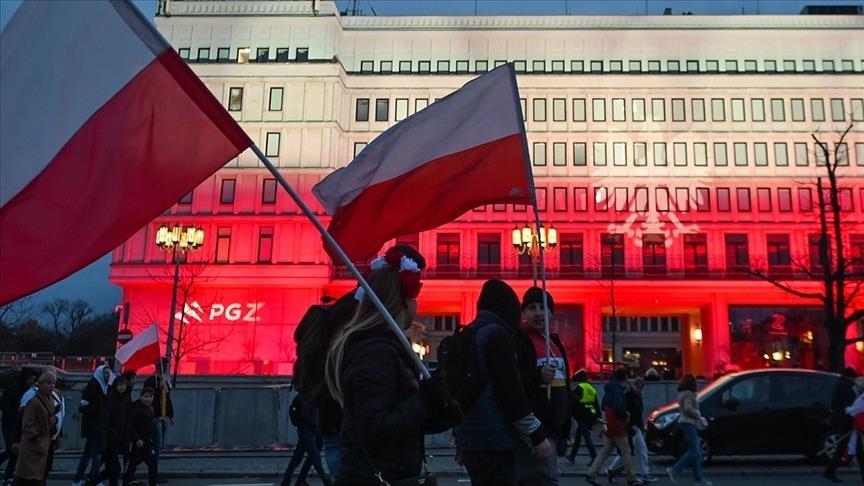Global Courant
WARSAW
As Ukraine looks to the West, Europe’s geopolitical center of gravity is shifting eastward, with US President Joe Biden’s visit to Poland in February sending a clear signal that Warsaw is now just as important to Washington as Berlin and Paris.
“The diplomatic balance of power is definitely shifting towards east-central Europe,” Pawel Markiewicz, Executive Director of the Polish Institute of International Relations in Washington, told Anadolu.
“Warsaw’s response to the war in Ukraine in both humanitarian and military-political contexts demonstrates that Poland is increasing its regional and European roles… it is serious about defending its European partners.”
The ongoing war in Ukraine and events with possible ripple effects in Russia and Belarus are dynamically recalibrating the geopolitical landscape in Eastern Europe. At stake is the future shape and form of NATO as well as potentially the EU.
France and Germany lost some of their influence in Washington because of their involvement in the Normandy Format negotiations with Russia, which many claim led to the Minsk Accords and set the stage for all-out war in Ukraine. Berlin’s failure to view the Nord Stream 2 gas pipeline as a strategic mistake also damaged its credibility.
“In the Ukraine war, obviously Poland, the Baltics and Scandinavians were mostly engaged, but for Atlantic countries like Ireland, Spain and Portugal it could be the Falklands – relatively remote geopolitically and quite peripherally,” said Albrecht Rothacher. a former EU diplomat, writer and political analyst.
“So the eastward shift in EU decision-making through national engagement is evident,” he said.
‘Biggest military power between Russia and France’
Since the war began in February 2022, Poland has registered more than 1.5 million Ukrainian refugees, praising Western powers.
Just last week, US Ambassador Mark Brzezinski hailed Poland as a “human superpower” that could lead post-war reconstruction efforts in Eurasia.
“This is an accelerating moment that could reshape not only Central and Eastern Europe, but the entire Eurasian region,” he said at a conference in Poland held by the American Chamber of Commerce.
Simultaneously, Poland significantly increased its defense budget, allocating 4% of its GDP, this is double the NATO requirement.
According to official data, the share of Polish military spending devoted to procurement increased from 20.4% to 35.9% in 2022.
Poland, the third largest contributor to Ukraine after the USA and the UK, has supplied hundreds of tanks, armored vehicles, missile and rocket systems and heavy weapons.
Aware that a close partnership with the United States is necessary to deter Russia, Poland has pushed for a permanent American military presence on its territory since joining NATO in 1999.
Currently, there are approximately 10,000 US troops in Poland, an increase of 6,000 since last year. Poland’s own army is expected to reach 300,000 professional soldiers and 50,000 civil defense personnel in the coming years.
Efforts to strengthen Poland’s military capabilities include the purchase of Abrams tanks, HIMARS rocket launchers and other high-quality weapons from the United States for large sums of money.
Warsaw is also proposing to become a maintenance hub for Abrams tanks deployed in Europe, while Polish factories are already repairing Ukrainian artillery and armor for reuse on the front lines.
In addition, Poland has received its first shipment of tanks and howitzers from South Korea, and is also purchasing 48 FA-50 light combat fighter jets.
Rothacher said the money from the NextGenerationEU funding, originally designed for post-COVID recovery, will allow Poland to “shift funds substantially to purchase weapons and military supplies from the United States and South Korea, thereby emerging as the largest military power between Russia and France”. . ”
the burden of history
The history of Poland was marked by the struggles against Russia in both the Tsarist and Soviet periods.
Poland, which had been divided by Russia for 128 years, re-emerged in 1918. Unsuccessful uprisings against Russian rule in 1831 and 1863 were met with repression and exile.
Since joining the EU in 2004, Poland has repeatedly warned of the threat posed by a resurgent Russia and has been at the forefront of calls for tougher sanctions against Moscow.
Pro-Kremlin media accused Poland of planning to attack Belarus and Ukraine.
Problems remain with unresolved historical events such as the mass murder of Poles by nationalist Ukrainian partisans in Volhynia in 1943 and in Eastern Galicia in 1944.
Polish retaliation resulted in the deaths of an estimated 20,000 to 25,000 Ukrainians in the Chelm region, and these conflicts led to the expulsion of about 800,000 Poles from what is now Western Ukraine and about 500,000 Ukrainians from Eastern Poland.
Tensions over historical events resurfaced when the Conservative Law and Justice (PiS) party won elections in 2015, challenging Ukraine’s reluctance to recognize Poland’s suffering.
Despite tensions, Polish-Ukrainian relations improved significantly.
A poll published by the daily Rzeczpospolita in April showed that around 80% of Poles viewed the relationship positively.
Ukrainian President Volodymyr Zelenskyy’s visit in April confirmed concerns, but some fear that the rise of Polish far-right parties such as the Confederation may put pressure on PiS so that the burden of history is not forgotten.
“The upcoming NATO summit will be a critical event for the future of the transatlantic security architecture,” said Markiewicz, referring to the high-risk meeting that will begin next week in Lithuania.
“Unfortunately, I do not expect the alliance to incorporate Ukraine yet.”
Only some of the news presented to subscribers in the AA News Broadcasting System (HAS) and in summary form are available on the Anadolu Agency website. Please contact us for subscription options.








